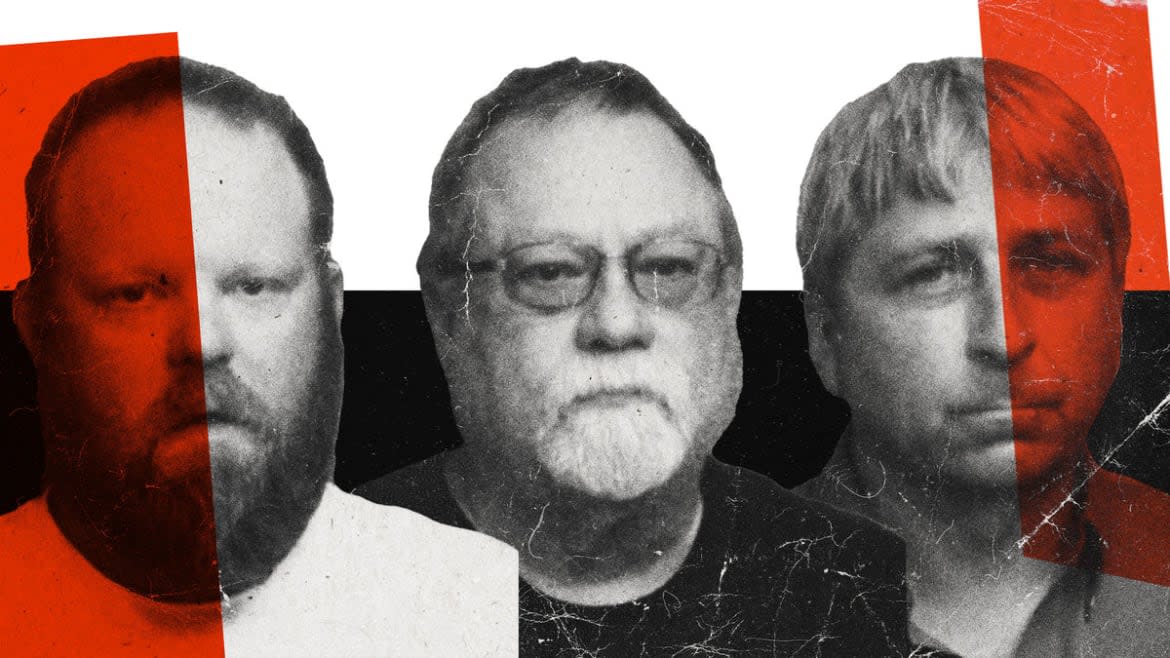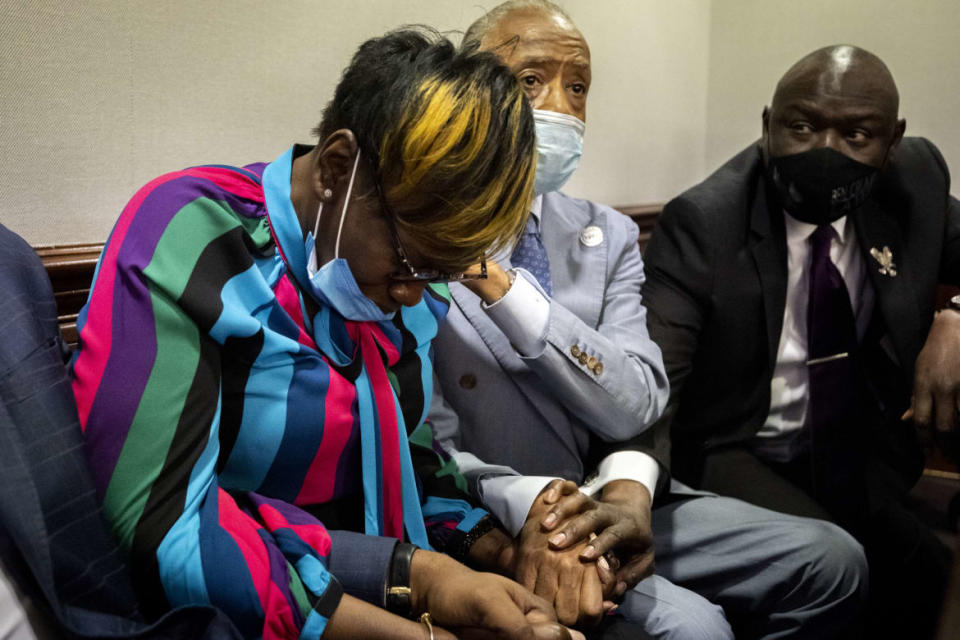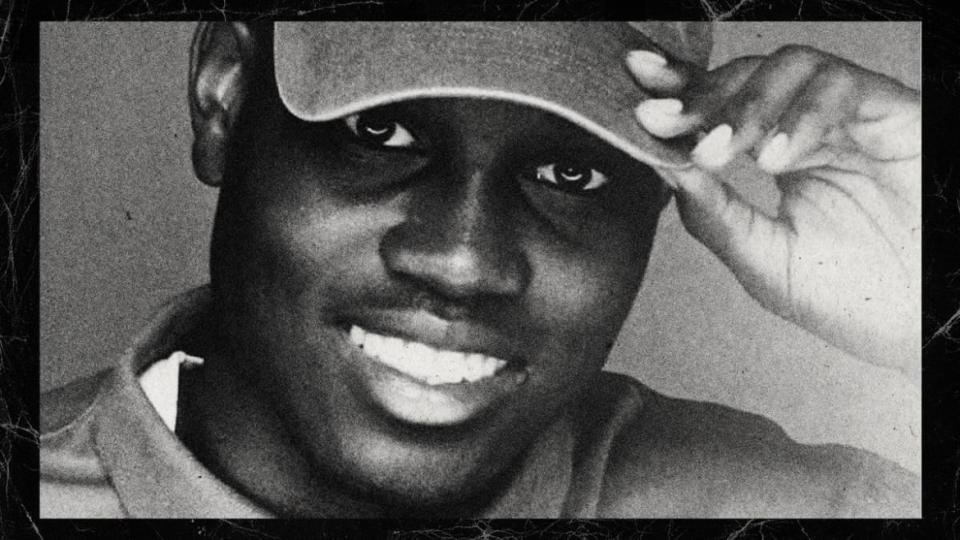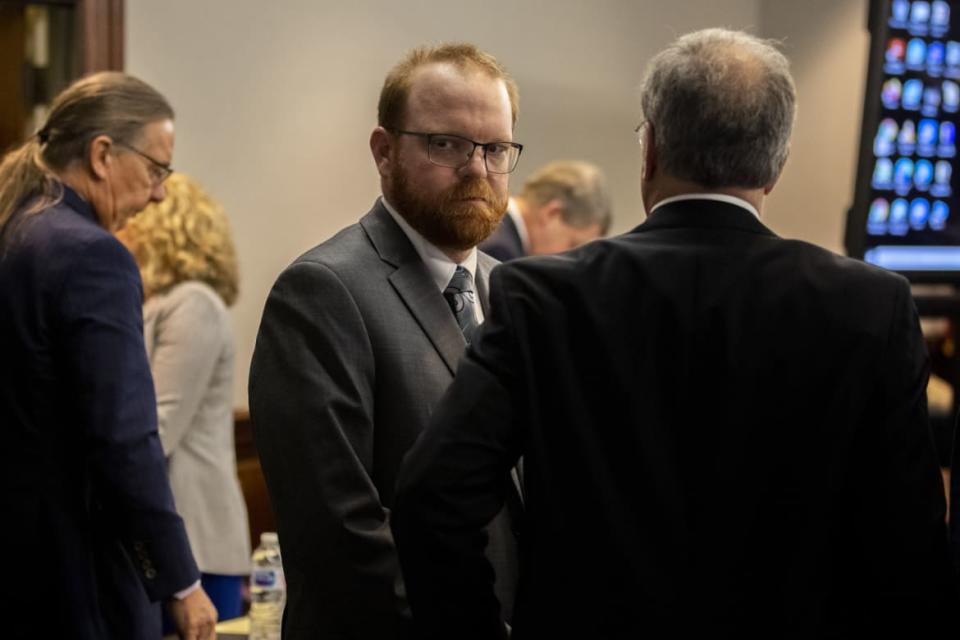White Vigilante Trio Guilty of Murdering Ahmaud Arbery in Georgia

BRUNSWICK—The white men accused of needlessly chasing and fatally shooting Ahmaud Arbery in cold blood in Georgia last February in what critics described as a modern-day lynching under the guise of vigilante law enforcement were found guilty of murder on Wednesday.
Travis McMichael was found guilty of the most serious offense, malice murder, in the Feb. 23, 2020 homicide death of Arbery, a 25-year-old Black man. Greg McMichael, his father, was found not guilty of malice murder but convicted of all other eight charges against him, including felony murder. William Roddie Bryan, a family neighbor, was found not guilty of malice murder, one count of felony murder, and one count of aggravated assault. He was, however, found guilty of three counts of felony murder, aggravated assault, and criminal attempt to commit false imprisonment.
Arbery’s slaying, captured in a dramatic video by one of its perpetrators, drew national outrage weeks before the police killing of George Floyd set off a wave of protest against racist cops across the country. And the verdict represented a potential rejoinder to white vigilantism across America.
“Especially after the [Kyle] Rittenhouse verdict, the stakes have never been higher for a conviction in this case,” former federal prosecutor Neama Rahman told The Daily Beast before the jury’s decision came down.
As Travis McMichael’s first guilty verdict was read, there was an audible cheer in the courtroom—prompting Chatham County Superior Court Judge Timothy Walmsley to admonish the gallery and ask for silence. Arbery’s mother, Wanda Cooper-Jones, sobbed aloud as Rev. Al Sharpton held her hand.
Walmsley said the trio’s sentencing date would be determined later, and the convicted murderers were escorted by court officials out of the room. The three men were wearing leg shackles and handcuffs en route to Glynn County Detention Center. Each man faces a maximum sentence of life in prison—plus separate, federal hate-crime charges.
In a press conference after the verdict, Cooper-Jones thanked supporters and admitted that she “never thought this day would come.”
“It’s been a hard fight, but God is good. [Ahmaud] will now rest in peace,” she said, flanked by her lawyers and Sharpton.
Brunswick Mayor Cornell Harvey told The Daily Beast that he believes the guilty verdicts will prove to the world that the Deep South isn’t what it used to be.
“This shows the world that you can get justice in a small southern town,” Harvey said. “Here, it doesn’t matter what color you are because justice has no color. I knew a long time ago that this was a spark for change in America. This shows the world that change can happen here and everywhere.”
Throughout the almost three-week trial, prosecutors argued that Arbery was on a jog through Satilla Shores, a mostly white neighborhood in Brunswick, Georgia, when the trio chased him down the street after wrongly suspecting him of burglary. Travis McMichael was caught on video footage—filmed by the third defendant, Bryan—firing the fatal shots.

Chanderan Williams, a 59-year-old Brunswick resident, told The Daily Beast that she’s just “grateful” for the outcome of the case.
“They did the right thing because we can jog on these streets,” Williams said. “We not bothering nobody and never have been. We need peace, we need to live in peace. Don’t be threatened by us because of our skin color. Don’t be threatened because we’re Black.”
The defense for the three men argued that they were trying to perform a citizen’s arrest on Arbery in connection with suspected break-ins in the area. Travis McMichael, who was the only one of the three defendants to testify on his own behalf and admitted Arbery never explicitly threatened him, nonetheless insisted to the jury that he fired his weapon because he believed it was “a life and death situation.”
“It is absolutely, horrifically tragic that this has happened,” Jason Sheffield, the attorney for Travis McMichael, said during closing arguments. “This is where the law is intertwined with heartache and tragedy. You are allowed to defend yourself.”
The verdict, which was reached in about nine hours over two days, marked a relatively rapid end to a criminal case that almost never started: While the fatal shooting occurred in Feb. 2020, it took 73 days, a damning video going viral, and allegations of prosecutorial misconduct before arrests were made.

Ahmaud Arbery
The conviction also comes just days after Rittenhouse, the teenager accused of murdering two people and trying to kill a third during unrest in Wisconsin last year after the police shooting of Jacob Blake, was acquitted of all charges after he testified that he acted in self-defense.
Kenya Thomas, a 46-year-old Brunswick native, hopes the guilty verdicts will force wannabe vigilantes to think twice in the future.
“You can’t initiate a confrontation with someone and then claim self-defense when it doesn’t go how you want it to,” Thomas told The Daily Beast. “We have laws and we have law enforcement for a reason. Just call the law and let the law handle things.”
“I just hope this is an eye-opener for our community—that you’re supposed to love your neighbor,” she added.
Even though not every count was returned with a guilty verdict, Thomas said she was pleased with the outcome, which she’d “prayed and hoped for.” She also noted that further accountability for the actions of the McMichaels and Bryan remains to be seen in an upcoming federal hate crimes case.
“[Bryan] didn’t want to testify about (Travis) standing over Ahmaud and calling him a n*****,” in this trial, Thomas told The Daily Beast, alluding to a pre-trial account by a state law-enforcement officer.
During closing arguments, Senior District Attorney Linda Dunikoski methodically detailed to jurors the circumstances that led to Arbery’s death. The details of the day, prosecutors argued, show that the trio had no right to detain Arbery under a citizen’s arrest because they had no proof he was even committing a crime in the first place.
“If you’re going to take the law into your own hands, you better know what the law is,” the prosecutor added.
In what was perhaps the most critical point in the trial, Travis McMichael took the stand to tell his “side” of the circumstances that resulted in Arbery’s death. Over his two days on the stand, he testified about how he felt qualified to help with the crime problem in this neighborhood because of his previous law enforcement training in the Coast Guard.
Part of the training, he said, included learning de-escalation strategies that he claimed included pointing a gun at someone.
‘Just Running’: Ahmaud Arbery’s Killer Admits He Wasn’t a Threat Before Chase
Two weeks before Arbery’s February 2020 fatal shooting, Travis McMichael said, he called authorities after seeing someone “lurking” outside a home under construction, whom he believed was “breaking in.”
On Feb. 23, McMichael testified, he was in the living room trying to get his son down for a nap when his “frantic” father, Gregory, walked in and said, “The guy that’s been breaking in down the road just ran by the house.” In addition to being an ex-cop, the elder McMichael had also worked as an investigator for the local DA’s office, a history that would loom large over the case immediately after Arbery’s killing.
“I assumed it was the same guy from Feb. 11. I think he told me to grab my gun... so I grabbed the shotgun,” Travis McMichael said, noting that the duo did not know whether Arbery was armed or not.
According to the defense, father and son quickly got into a pickup truck to chase after Arbery and ask him what was going on. Travis McMichael told jurors that he was surprised that Arbery was “angry” but admitted that he never yelled, threatened, or brandished a weapon at the McMichaels.
“He did not threaten me verbally, no,” the younger McMichael said. “He was just running.”
Around the same time, prosecutors said, William “Roddie'' Bryan, another Satilla Shores resident, saw the McMichaels following Arbery and jumped into his own pick-up truck to help out—and record the encounter on his cellphone. Travis McMichael testified that he did not know Bryan and, in fact, assumed he was Arbery’s getaway vehicle.
One Glynn County police officer testified that Gregory McMichael admitted he yelled, “Stop, or I’ll blow your fucking head off” to Arbery during the chaotic chase. Travis McMichael testified he got out of the car to confront Arbery, who he claimed grabbed for his gun during a struggle.
“He had my gun. It was obvious that he was attacking me and if he’d have gotten the shotgun from me, it’d be a life and death situation,” McMichael said Wednesday.
Dr. Edmund R. Donoghue, a forensic pathologist at the Georgia Bureau of Investigation, testified last week that Arbery suffered multiple shots at very close range—including wounds to the chest, wrist, and armpit. Donoghue determined that the wounds—which were captured on Bryan’s now-infamous footage of the incident—were fatal and there was nothing emergency responders could have done to save Arbery’s life.
Glynn County Police Department Officer Jeff Brandenberry, who interviewed Gregory McMichael on the scene of Arbery’s killing, said the former investigator admitted that if his son didn’t pull the trigger, he was ready to do so himself. The shocking testimony may have poked holes in the defense’s theory that the father and son duo were simply exercising a citizen’s arrest on Arbery or justified in the shooting per the state’s controversial “State Your Ground” law.
The citizen’s arrest law has since been repealed.

Travis McMichael looks back at his mother and sister in the courtroom after the jury convicted him for the murder of Ahmaud Arbery.
“To be perfectly honest with you, if I could have gotten a shot at the guy, I’d have shot him myself,” Gregory McMichael said, according to a transcript of Brandenberry’s body-camera footage from the day that he read out in court.
Ronald Carlson, a professor in the University of Georgia School of Law, said there were several major testimonial points in the trial that aided a prosecutorial win—one being the two Glynn County police officers who showed the willingness of the McMichaels to fire their firearms at Arbery.
“Hearing that Gregory McMichael was also willing to shoot at Arbery if need be kind of blows the defense’s argument that a legal weapon was only used as a last resort,” Carlson told The Daily Beast.
After the incident, Travis McMichael told jurors that while he was “nervous” while he was being interviewed by police, he never thought he would go to jail for killing Arbery because he was simply “going through an investigation.”
“I just killed a man. I had blood on me still. It was the most traumatic event of my life. I was scared to death,” McMichael said. “This was the most traumatic event I’ve been through in my life.”
If the killing was traumatic for the white men behind it, that didn’t stop them from moving quickly to shore up their defense: One of Gregory McMichael’s first calls after the shooting, prosecutors say, was to Brunswick District Attorney Jackie Johnson, where he left a voicemail seeking advice.
While it was not clear whether Johnson called him back, the former DA recused herself from the investigation on Feb. 27, 2020, when she revealed that Gregory had been a longtime investigator for her office. At the time, Johnson referred the case to Waycross District Attorney George E. Barnhill.
In early April 2020, Barnhill recused himself as well, noting in a letter that his son worked in Johnson’s office, and had even worked with Gregory McMichael on a prosecution involving Arbery.
But before completely relinquishing control of the case, Barnhill wrote a letter to the Glynn County Police Department arguing that there was “insufficient probable cause to issue arrest warrants” for Bryan and the McMichaels.
The letter detailed the DA’s reasoning against prosecution, stating that it appeared the trio’s intent “was to stop and hold” a burglary suspect until law enforcement arrived, and their citizen’s arrest actions were “perfectly legal” under Georgia law. Barnhill added that Travis McMichael and his father were within their rights to carry their firearms that day under Georgia’s open-carry law—and that the scuffle between the younger McMichael and Arbery gave him grounds “to use deadly force to protect himself” under state law.
Johnson, who lost her re-election bid in 2020, has since been indicted on charges of violating her oath as a public officer and obstructing a police officer for how she handled the episode.
As small groups mingled and discussed the verdict outside the courthouse Wednesday, the historical significance of the case was inescapable.
“My grandson used to run with Ahmaud. They were best friends. That could have been him,” Gina Pyles, 59, of Brunswick told The Daily Beast.
“At some point,” she added, “people have to stop seeing people as a threat because of the color of their skin.”
Got a tip? Send it to The Daily Beast here
Get our top stories in your inbox every day. Sign up now!
Daily Beast Membership: Beast Inside goes deeper on the stories that matter to you. Learn more.

